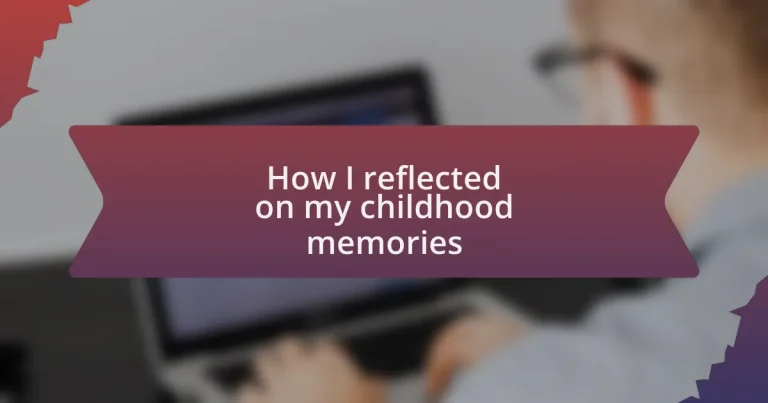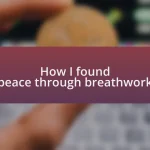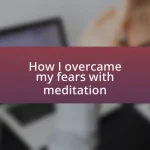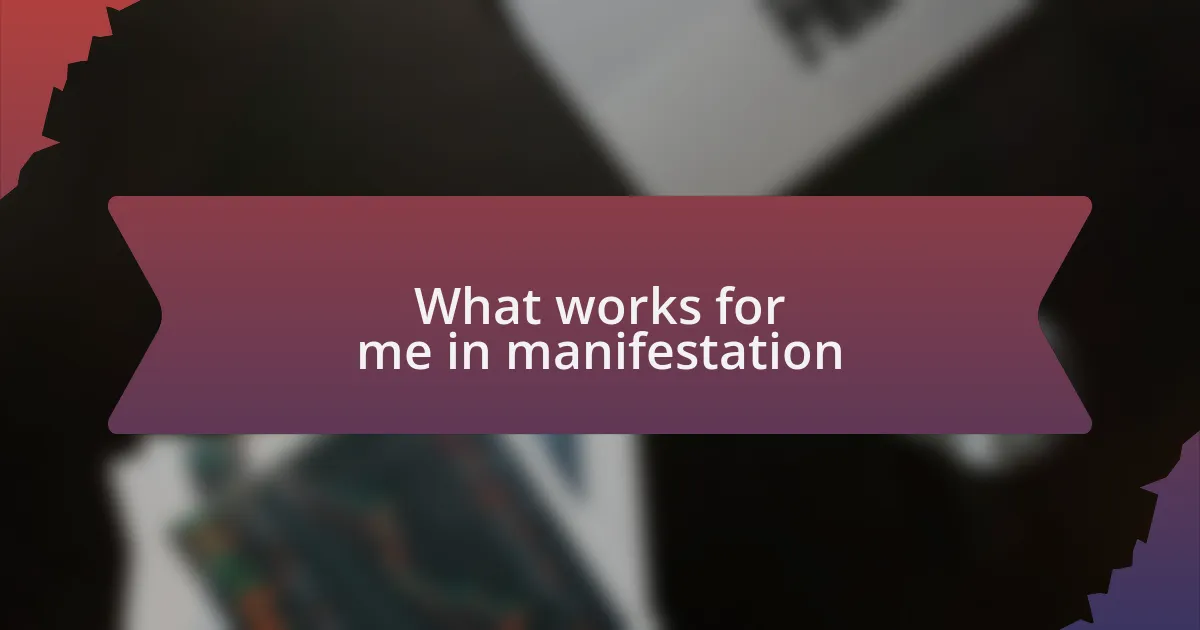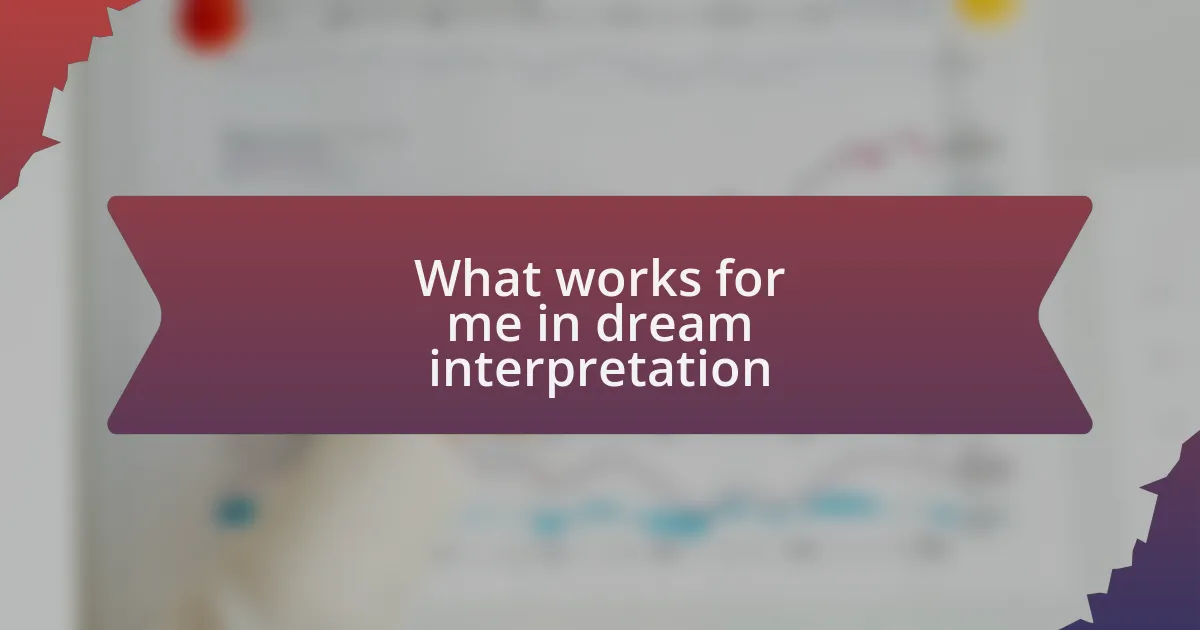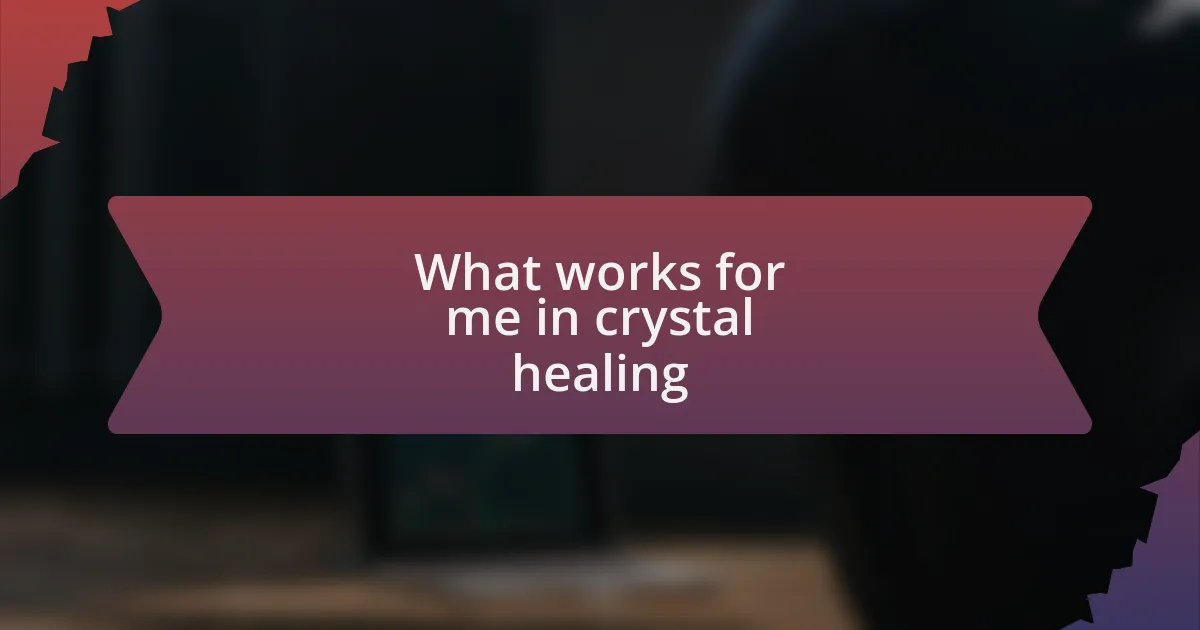Key takeaways:
- Childhood memories blend emotion and nostalgia, shaping our perceptions of joy and influencing our identities.
- Reflection on past experiences can lead to personal growth, clarity, and an understanding of how those experiences mold our beliefs and fears.
- Paranormal stories from childhood not only spark imagination but also impact our beliefs about the unknown, creating a deeper curiosity as adults.
- Techniques like sensory anchors, journaling, and using visual aids can effectively unlock and enhance the recall of childhood memories.
Author: Evelyn Hartman
Bio: Evelyn Hartman is a contemporary author known for her evocative storytelling and rich character development. With a background in psychology, she weaves intricate narratives that explore the complexities of human relationships and personal growth. Her debut novel, “Whispers in the Wind,” garnered critical acclaim and established her as a powerful voice in modern literature. Evelyn resides in the Pacific Northwest, where she draws inspiration from the vibrant landscapes and diverse communities around her. When she’s not writing, she enjoys hiking, gardening, and spending time with her two rescue dogs.
Understanding childhood memories
Childhood memories are fascinating windows into our past, revealing not just what we did, but how we felt during those formative years. I often find myself reflecting on simple moments, like running through my grandmother’s backyard, where the smell of freshly cut grass mingled with the sound of laughter. Isn’t it incredible how those small experiences can shape our perception of joy?
When I think of certain memories, they often come with an emotional weight—like a favorite toy that reminds me of comfort and safety. Have you ever revisited a place from your childhood and felt an overwhelming rush of nostalgia? For me, it happens every time I step foot in my old school; the echoes of friendship and innocence linger in the air, almost as if time stands still.
Yet, memories are not always crystal clear. I remember certain faces and places, but the details sometimes fade, leaving only a sense of warmth or unease. How do these wisps of recollection continue to influence who we are today? In my experience, it’s this blend of clarity and ambiguity that makes reflecting on childhood so profoundly meaningful.
The significance of reflection
Reflection plays a vital role in transforming memories into valuable life lessons. I remember a time when I sat alone in my room, staring at old family photos, and suddenly I was transported back to moments filled with laughter and the warmth of family gatherings. Those recollections helped me understand not just who I was, but the values that shaped my character. Have you experienced such epiphanies during moments of reflection?
Taking time to reflect allows us to analyze how our past influences our present. I often find myself contemplating the challenges I faced as a child, like dealing with personal insecurities. These reflections have not only brought clarity but have also empowered me to embrace resilience. Have you ever thought about how your past struggles have molded who you are today?
Moreover, engaging in reflection can foster a deeper connection to our feelings and experiences, enriching our understanding of ourselves. When I think back to my childhood fears—like the dark corners of my room or the unfamiliar creaks in the house—I recognize how those fears shaped my adulthood, teaching me courage. Isn’t it interesting how looking back can illuminate aspects of ourselves we often overlook in the rush of daily life?
Exploring the paranormal aspect
When I reflect on my childhood, I can’t help but remember the eerie tales my grandmother used to tell by candlelight. Those stories, filled with ghosts and unexplained events, made my heart race and ignited my imagination. Have you ever noticed how such tales can blur the line between reality and fantasy, leaving us to ponder the possible presence of the unknown in our daily lives?
I also think about those unsettling moments when I sensed something was off in our old house—like the time I heard whispers coming from an empty room. My instincts screamed for me to flee, yet my curiosity kept me rooted to the spot. It’s fascinating how these experiences can open our minds to the idea that there is more to our environment than meets the eye, isn’t it?
Exploring these paranormal aspects of my childhood has uncovered a well of emotions, ranging from fear to wonder. I now see those moments not just as childhood fears but as gateways to understanding how my perception of the world shifted. Isn’t it intriguing how these ghostly experiences can shape our beliefs in the supernatural as adults?
How memories shape our beliefs
Our memories often serve as the foundation for our beliefs about the world around us. For instance, I vividly recall sitting in my room as a child, staring at my closet door, convinced that something lurked just beyond the wooden panels. This fear, though rooted in a child’s imagination, transformed my understanding of safety and danger, shaping my beliefs about unseen forces that could exist beyond the ordinary.
Looking back, I can see how those childhood terrors influenced my later fascination with the paranormal. When I encountered stories of spirits or urban legends as a teenager, they didn’t seem entirely alien; instead, they felt like extensions of my own experiences, validating my childhood fears and stirring a deeper curiosity. Have you ever felt that the stories you heard as a child have colored your lens as an adult? I certainly have, and it’s intriguing to think about how these early narratives can mold our perceptions and beliefs.
Furthermore, the emotions tied to these memories—fear, excitement, and even thrill—play a crucial role in how we construct belief systems. I remember feeling a rush of exhilaration when I bravely explored our supposedly haunted attic, yearning to connect with the mysteries hidden there. It’s fascinating to realize that these moments not only shaped my views on the paranormal but also instilled a sense of wonder that fuels my ongoing pursuit of understanding the unexplained.
Techniques for recalling memories
Revisiting childhood memories can be a powerful experience, and one effective technique I’ve found is to create a sensory anchor. For example, I often find that specific scents—like the smell of freshly cut grass or warm cookies—can rapidly transport me back to particular moments in my childhood. I encourage you to consider what scents or sounds resonate with you; they might unlock hidden memories just waiting to be recalled.
Another approach that works for me is journaling. When I sit down to write about my experiences, I can almost feel the emotions tied to those memories flooding back. It’s like pulling on a thread that unravels a tapestry of my past. Have you ever tried writing about your childhood? It can be surprising how much detail comes rushing back when you give yourself the space to reflect on your experiences.
Visual aids can also aid in memory recall. I love going through old family photos or watching films from my childhood era, as they evoke emotions and details I thought I had forgotten. Each image seems to act as a portal to moments filled with laughter or even nostalgia. Have you explored old photographs to jog your memory? You might find them to be a window into experiences that continue to shape who you are today.
Personal experiences with childhood
There’s something truly magical about childhood friendships that often defines those early years for many of us. I vividly remember my best friend, who lived just a few houses down the street. We would spend countless summers exploring the woods, inventing wild stories about hidden treasures and secret hideouts. Reflecting on those days, I realize how pure and unfiltered our imaginations were—do you remember what that felt like?
I often think back to family gatherings, where laughter echoed through the rooms, and the smell of my grandmother’s cooking filled the air. Those moments were steeped in warmth and love, making me feel secure and cherished. Each holiday was like stepping into a scene from a storybook, with lively conversations and the reassurance that I belonged. Has there been a gathering in your past that left such a lasting impression?
I also can’t ignore the darker, more mysterious memories that linger from my childhood. One chilly evening, I could have sworn I saw a shadowy figure in my backyard, which sent shivers down my spine. Although I dismissed it as my imagination, that experience sparked my fascination with the unexplained. Have you ever encountered something that made you question reality? Those incidents, unsettling as they were, pushed me to reflect on the deeper mysteries of life.
Sharing insights through a podcast
Sharing insights through a podcast allows us to explore and communicate our experiences in a unique way. I remember recording an episode where I delved into one childhood adventure, recounting a day spent chasing fireflies with friends. As I spoke, I could almost feel the warmth of the summer night wrap around me again, igniting memories that had long faded. Have you ever revisited a moment and found it still holds emotional weight?
The beauty of a podcast lies not just in reliving memories but in sharing the lessons learned along the way. During another episode, I opened up about my family’s traditions, discussing how they shaped my understanding of belonging. I could feel the connection with listeners who shared similar backgrounds—those little threads of commonality weave a tapestry of shared experiences. Isn’t it fascinating how stories can unite us, often through the simplest of details?
Engaging with my audience through questions keeps the conversation alive and relatable. One time, I posed a question about ghost stories from childhood, inviting listeners to reflect on their own eerie experiences. The responses poured in, forming a community dialogue that extended far beyond my own experiences. How can a single moment from our past resonate so profoundly with others? This is the power of sharing insights through a podcast—transforming personal reflections into a collective exploration of our shared humanity.
